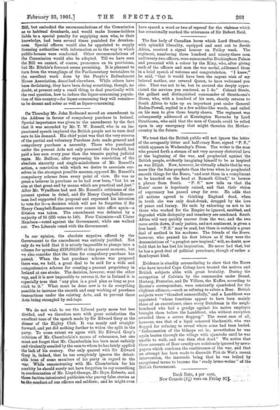On Thursday Mr. John Redmond moved an amendment to the
Address in favour of compulsory purchase in Ireland. Special importance was given -to the amendment by the fact that it was seconded by Mr. T. W. Russell, who in an im- passioned speech implored the British people not to turn deaf ears to his demand. His chief point was that the very success of the partial and voluntary Purchase Acts made general and compulsory purchase a necessity. Those who purchased under the present Acts not only possessed the freehold, but paid a less sum every year than the tenants paying judicial rents. Mr. Balfour, after expressing his conviction of the abiolute sincerity and single-mindedness of Mr. Russell's action, a conviction with which we desire to associate our- selves in the strongest possible manner, opposed Mr. Russell's compulsory scheme from every point of view. He was as great a believer in purchase as he had ever been," but let us aim at that great end by means which are practical and just." After Mr. Wyndham had met Mr. Russell's criticisms of the present system in detail, and Sir Henry Campbell-Banner- man had supported the proposal and expressed his intention to vote for it—a decision which will not be forgotten if Sir Henry Campbell-Bannerman ever comes into office again—a division was taken. The amendment was defeated by a majority of 95 (235 votes to 140). Four Unionists—all Ulster Members—voted against the Government, while one walked out. Two Liberals voted with the Government






































 Previous page
Previous page